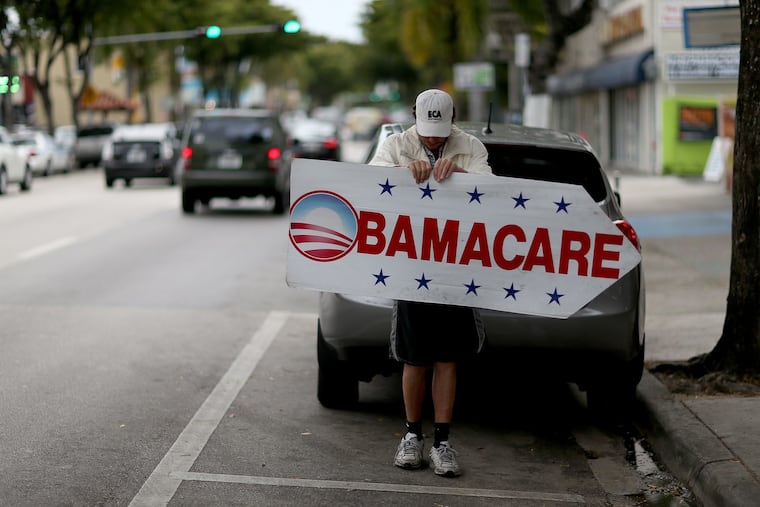Obamacare insurance policies will likely improve under Biden and be crucial during the coronavirus
Some 2.3 million Americans have lost health insurance during the Trump administration. Obamacare might help.

Obamacare has a long-standing friend in President-elect Joe Biden. The program enacted while he was vice president extends health coverage to 22 million Americans who would otherwise be unable to obtain it, including many in the gig economy who work without health benefits.
It could be a lifeline if you’re among the five million who have lost employer coverage since COVID-19 began or are among the millions more who may suffer a similar fate. Expanding the law was a major theme for Biden during the presidential campaign.
Obamacare, formally known as the Affordable Care Act, has not fared well under the Trump administration. Although he failed to fulfill a campaign promise to repeal it entirely, President Donald Trump has taken a series of actions to restrict two of its pillars: subsidized coverage for low-income buyers through online exchanges and broader eligibility for Medicaid. An estimated 2.3 million Americans have lost health coverage since he took office.
Trump is also supporting a legal challenge before the Supreme Court seeking to invalidate the entire law. However, questioning by justices at a hearing on the case earlier this month suggests that the challenge will not succeed.
Biden has ambitious plans for Obamacare. He would like to add a public insurance plan modeled on Medicare as an option for consumers on the exchanges and expand subsidies for low-income purchasers. However, these steps would require approval by Congress, where resistance is likely to be strong, even among some Democrats.
But Biden can still make significant changes affecting millions in the year ahead. Where might he start? Reversing these four Trump administration actions is a likely place.
Insurance exchange basics
The exchanges are websites where you can buy a policy directly from an insurance company for yourself or your family, if you can’t get one elsewhere. You can receive a subsidy to help with the cost if your income is less than 400% of the federal poverty level — currently $51,040 for an individual and $104,800 for a family of four. This year, 84% of exchange consumers did. These subsidies mean that plans may be free or very low cost if you qualify.
Pennsylvania and New Jersey run their own exchanges — https://pennie.com and https://nj.gov/getcoverednj — and both states have enrollment periods open now when you can switch or buy plans for any reason. Pennsylvania’s enrollment runs until Jan. 15, and New Jersey’s extends to Jan. 30. Changes at other times require a life event such as switching jobs or a divorce.
Residents of 36 other states use an exchange run by the federal government, healthcare.gov. For these consumers, Trump shortened the length of open enrollment from 90 days to 45. This year, it will end Dec. 15. He also slashed funding for advertising to publicize open enrollment and for navigators who help consumers with the enrollment process.
» Here are Philly’s current COVID-19 guidelines: inquirer.com/phillyguidelines
Antoinette Kraus, director of the Pennsylvania Health Access Network, which advocates for broader access to health insurance, said these actions “have only made it harder for families to access and maintain coverage during the pandemic.” They would be easy for Biden to reverse.
Biden could extend open enrollment back to its original length or go a step further by adding a special open enrollment period in January. Laval Miller-Wilson, executive director of the Pennsylvania Health Law Project, sees this as “especially important for those newly uninsured due to the pandemic.”
Short-term insurance plans
Obamacare mandates coverage of several “essential” services under most policies, but it exempts some short-term plans. These were intended as a bridge for those who lose insurance until they can obtain a fully compliant policy. They are often called “skinny” plans, not just because of their cheaper price. They cover fewer services, are subject to maximum coverage limits, and can be rescinded more easily. Purchasers are also ineligible for premium subsidies.
Trump extended the maximum coverage period for these plans from three months to just under a year, making them an alternative to more expensive policies on the exchanges. However, many buyer may be shocked by the severe limits on coverage when they file claims. Obamacare supporters also worry that they could lure away healthier consumers and destabilize the exchange markets. Biden could demote them back to true short-term status.
Contraceptive coverage
Obamacare requires most policies to cover many forms of preventive care without deductibles or co-payments. One of those forms of care is contraception, and some religious employers that offer health coverage have objected to having to provide it. The Obama administration exempted many of them, and in 2014 the Supreme Court ruled that the exemption must be extended to small family-owned businesses.
The Trump administration extended the exemption even further to any employer that objects to covering contraceptives, and the Supreme Court upheld that action in July. The Biden administration could reverse it and make contraceptive coverage more widely available.
Medicaid work requirements
Most of those who gained coverage under Obamacare did so through Medicaid in one of the 38 states that chose to expand it, including Pennsylvania and New Jersey.
The Trump administration wants to approve requests from several of those states to test a new condition on eligibility – a requirement that recipients show they have a job or are actively searching for one. So far, courts have put most of those requests on hold. In Arkansas where they took effect, many Medicaid beneficiaries found the paperwork needed to prove compliance daunting and lost coverage as a result.
The Biden administration could end that experiment before it goes further.
Obamacare is enjoying growing public support. The Kaiser Family Foundation reports that its popularity now equals the all-time high. That should help Biden as he moves to extend its reach.